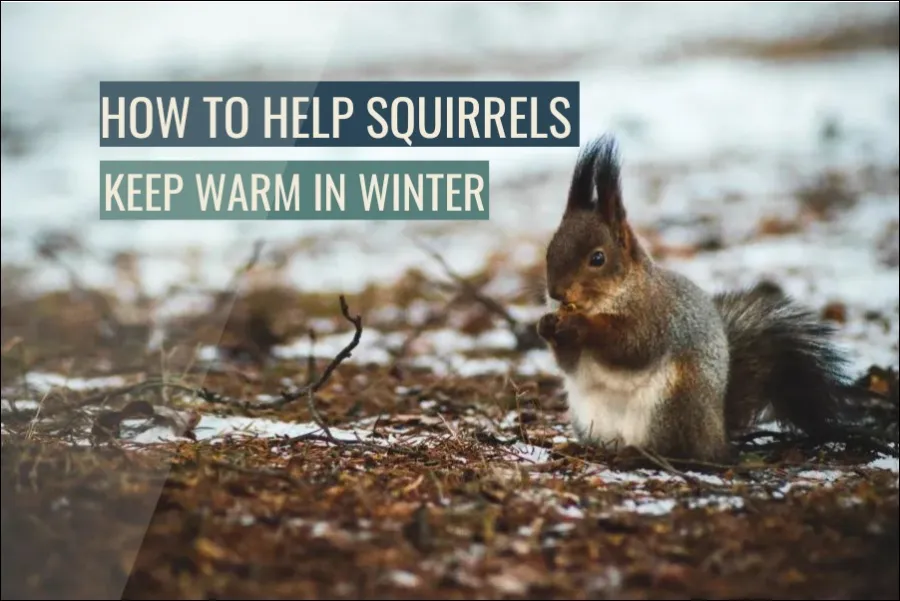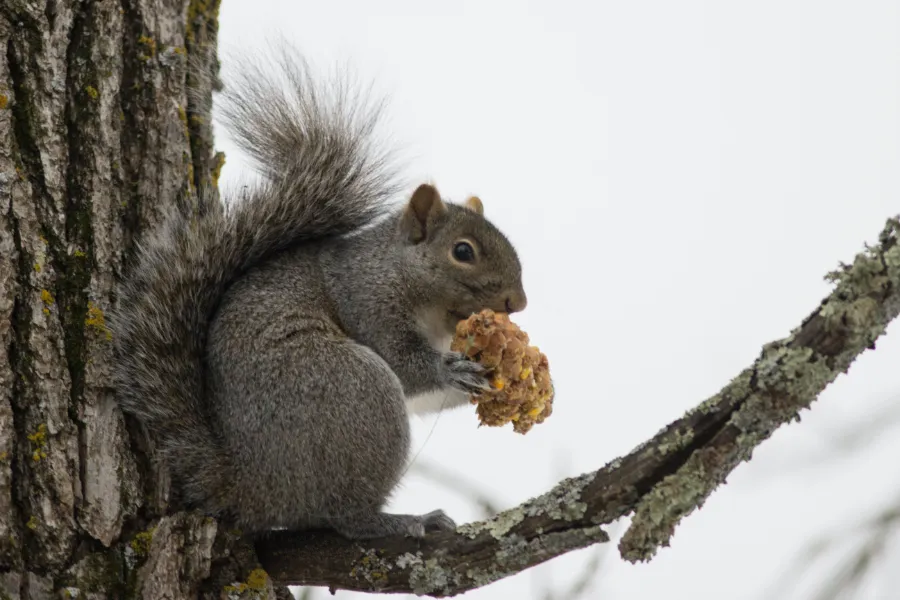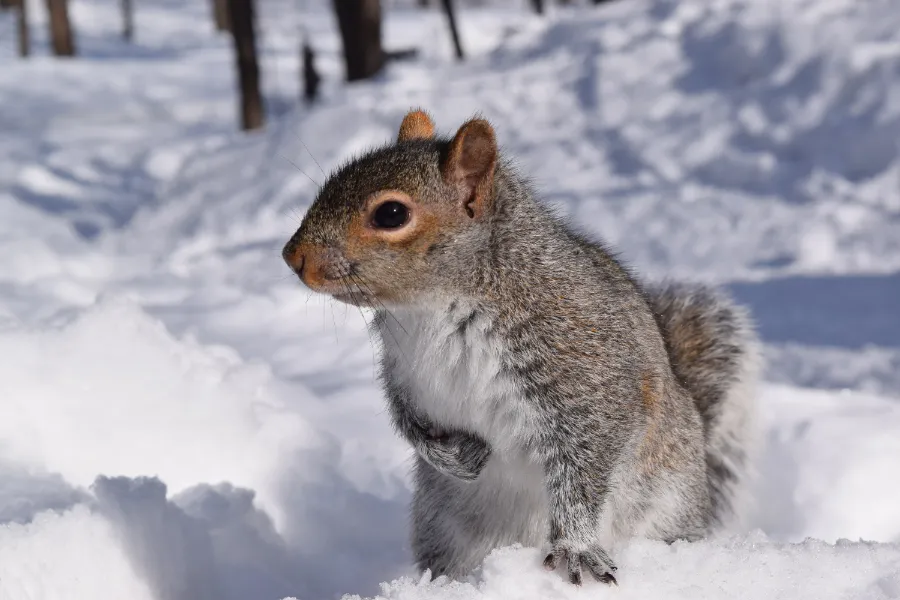
As the temperatures drop and winter approaches, it’s important to make sure that all of our outdoor friends are well taken care of, including our beloved squirrels.
To help squirrels stay warm in winter, provide food & water, offer shelter & protection, and create a warm & safe environment in your backyard. Keep outdoor pets under control and be mindful of road safety. Donate to wildlife conservation efforts and educate others about squirrel care.
With a little preparation and some simple steps, you can help squirrels stay warm and healthy throughout the cold winter months.
Provide food and water
To survive the winter, squirrels require a regular supply of food and water. They harvest and store nuts and seeds in the wild as a food supply for the winter seasons. You may augment their nutrition by providing a variety of nuts and seeds at a squirrel feeding station or by placing squirrel-specific bird feeders out. Choose high-quality, nutrient-dense diets and avoid those that are poisonous to squirrels. Peanuts, sunflower seeds, and walnuts are all wonderful choices. You may also provide fresh fruits and veggies as a reward, but avoid anything rotten or moldy.
In addition to food, it is critical that squirrels have access to clean, fresh water. Squirrels may struggle to locate water in frigid conditions because sources may be frozen over or sparse. You may aid by providing a warm water dish or using a water bottle with an integrated heater to protect the water from freezing. Check the water periodically and replace it as needed to keep it clean and from freezing.
You can assist squirrels keep nourished and hydrated throughout the winter by providing a consistent source of food and water. This is especially crucial during cold spells or when natural food sources are sparse.
Offer shelter and protection.
During the winter, squirrels require a warm and safe location to sleep and relax. In the wild, they may seek cover in tree holes, nest boxes, or leaf nests. You may assist by placing fake nest boxes or shelters in your yard. These are available for purchase or can be created at home from recycled materials such as wooden crates or plastic containers. Place the shelters in a safe spot, such as beneath a building’s eaves or in dense shrubbery, and face them away from the wind.
You may give extra insulation and safety for squirrels by laying dried leaves, straw, or pine needles at the base of trees or in the corners of your yard, in addition to a designated shelter. This can provide a pleasant and comfy environment for squirrels to nestle and stay warm. Just be careful not to use any items that have been treated with chemicals or pesticides, since these can be toxic to squirrels.
You can help squirrels keep warm and safe during the winter by providing shelter and protection. This is especially critical during severe weather or when temperatures drop dramatically.
Keep an eye on their health
Squirrels, like other animals, are susceptible to disease or injury, especially during the winter when they are more exposed to the weather. It is critical to monitor their behavior and looks in order to ensure their health and well-being. If you see any symptoms of disease or injury, such as lethargy, loss of appetite, or obvious wounds, you should seek the advice of a wildlife rehabilitator or veterinarian.
In addition to monitoring their health, you may take precautions to avoid disease or damage by keeping their surroundings clean and safe. This involves getting rid of any possible risks like sharp items, hazardous chemicals, or unattended garbage cans. Handling or trapping squirrels should also be avoided since it might stress them out and increase the risk of harm.
You can help squirrels stay healthy and robust during the winter by keeping an eye on their health and implementing preventive steps.
Avoid disturbing their natural habitats.
Squirrels, like other critters, have a natural instinct to defend and preserve their area. While it may be tempting to approach or engage with squirrels, keep in mind that they are wild creatures that must be treated with care. Disturbing their natural habitats, as well as attempting to catch or manage them, can create stress and be harmful to both the squirrels and humans.
To prevent upsetting their habitats, stay a safe distance and avoid immediately approaching or feeding squirrels. You may continue to give food and water, but you must do it in a method that allows the squirrels to obtain it without being touched or handled. You should also avoid disturbing or stressing them by messing with their nests or shelters.
You can help squirrels stay healthy and secure over the winter by respecting their natural habitats and activities.
Create a warm and safe environment in your own backyard
During the winter, your backyard might be an excellent area to support and observe squirrels. You can encourage squirrels to visit by providing a warm and safe habitat in which they may rest and feed.
Providing a variety of plants and trees that yield nuts, seeds, and berries is a simple method to create a friendly environment. This can give squirrels and other animals with a natural food source. You may also attract squirrels and other wildlife by placing bird feeders and water supplies. Simply maintain the feeders clean and supplied, and avoid using harmful or non-nutritious meals.
You may establish a safe environment by removing any possible risks such as sharp items, hazardous chemicals, or unsecured garbage cans, in addition to providing food and shelter. This can assist to avoid accidents or injuries while also making your backyard a more fun and friendly environment for squirrels.
You may help squirrels and other animals survive over the winter months by establishing a warm and secure environment in your own garden.

Consider building a squirrel house or feeding station
If you want to take your squirrel advocacy to the next level, try creating a squirrel housing or feeding station. These may be bought or manufactured at home from recycled materials like wooden crates, plastic containers, or PVC pipes.
A squirrel home provides a warm and safe environment for squirrels to sleep and relax, whereas a feeding station provides an accessible and consistent source of food. Both may be put in a secure area of your yard, such as beneath the eaves of a building or in a dense shrubbery, and can be stocked with a variety of squirrel-friendly nuts, seeds, and other goodies.
By constructing a squirrel home or feeding station, you may provide a dedicated location for squirrels to visit and forage, therefore supporting their health and well-being over the winter.
Keep outdoor pets under control.
While squirrels and other wildlife are naturally interested about humans and their environment, it is critical to keep outdoor pets under control to avoid accidents or injury. This is especially true in the winter, when squirrels are more active and conspicuous.
To keep your pets safe, keep an eye on their interactions with squirrels and other animals. If you have a dog, keep it on a leash when outside and train it to appreciate wildlife. You might also think about putting up fence or obstacles to keep dogs and wildlife apart.
You may help prevent accidents and injuries by keeping outdoor pets under control, as well as foster a safe and harmonious atmosphere for all of the animals in your yard.
Be mindful of road safety
While squirrels are typically nimble and competent at navigating their surroundings, they can be injured or killed by automobiles on the road. To assist in the protection of squirrels and other animals, it is essential to be aware of road safety and take precautions to decrease the danger of accidents.
Slowing down when driving through locations where squirrels and other animals are numerous, such as forests, parks, or residential areas, is one simple approach to do this. Be on the lookout for animals on or near the road and be prepared to stop or take evasive action if required.
Aside from driving cautiously, you may assist lessen the likelihood of an accident by keeping your automobile well-maintained and in good functioning condition. This includes testing your brakes, tires, and lights on a regular basis and making any required repairs.
You may help safeguard squirrels and other animals from accidents and injury by being aware of road safety and taking measures.
Donate to wildlife conservation efforts
Donating to conservation activities is another method to help squirrels and other species over the winter. Many organizations and charities seek to maintain and preserve animal habitats, and your donations may help support and make a difference in their efforts.
The National Wildlife Federation, the Wildlife Conservation Society, and the World Wildlife Fund are all worthwhile organizations to consider. Check with local wildlife groups or charities in your region to see if they have any special needs or projects that you can help with.
You can help safeguard squirrels and other animals by giving to wildlife conservation programs, ensuring that they have the resources and assistance they require to survive.
Educate others about squirrel care in winter
Finally, you can aid squirrels and other species by teaching others about proper winter care. This might involve giving advice and information on how to provide food and shelter, monitor their health, and prevent harming their natural habitats.
You may also urge people to join conservation initiatives and to conduct ecologically friendly activities that benefit animals. This can involve things like cutting down on waste, saving resources, and protecting natural environments.
You can help create a more caring and supportive environment for all animals by teaching people and promoting awareness about squirrel care and protection.
I hope this information is useful and inspires you to write an article about how to keep squirrels warm in the winter. If you have any more queries or want extra assistance, please do not hesitate to inquire.

Can squirrels feel cold?
Yes, squirrels, like people and other animals, can experience cold. They have a natural inclination to seek out warm and safe areas to stay warm and regulate their body temperature. Squirrels may travel to lower altitudes or more sheltered regions in the winter to obtain food and shelter, and they may roost in their nests or other protected spots to remain warm.
Squirrels have a variety of physiological and behavioral adaptations that aid in their adaption to cold temperatures. They, for example, have a thick covering of fur that acts as insulation and keeps them warm. They can also slow their metabolic rate and become less active to preserve energy and prevent heat loss. Furthermore, squirrels have been recorded huddling together or sharing nests in order to remain warm and avoid hypothermia.
Overall, squirrels are well acclimated to cold weather, but they may still feel the effects of excessive cold and will take measures to be warm and sheltered in order to live.
What is the lowest temperature a squirrel can survive?
This topic is difficult to address precisely because squirrels have a variety of physiological and behavioral adaptations that allow them to survive with cold weather. A squirrel’s ability to live at the lowest temperature is determined by a variety of factors, including species, age, size, bodily condition, and access to food, shelter, and other resources.
Squirrels, in general, are well suited to low temperatures and can thrive in a wide range of habitats, from tropical rainforests to subarctic tundra. Some squirrel species, such as the Siberian chipmunk and the Arctic ground squirrel, are adapted to severe cold and may survive in temperatures as low as -40°F (-40°C). Other species, such as the eastern gray squirrel, are less cold-weather suited and may struggle to survive in temperatures far below zero.
Squirrels may utilize behavioral measures such as huddling together or sharing nests to remain warm and lower the danger of hypothermia in addition to their natural adaptations. They may also seek out warm and safe locations to remain warm and withstand harsh weather, like as burrows, tunnels, or nest boxes.
Overall, it is obvious that squirrels can survive in a wide range of freezing temperatures, but they are still sensitive to extreme cold and will take precautions to be warm and protected.
In conclusion
Squirrels may be a charming and engaging presence in many yards and gardens. As winter comes and temperatures decrease, it is critical to ensure that squirrels are well cared for and have the nutrients they require to survive the colder months. In this post, we addressed how to keep squirrels warm and healthy throughout the winter, covering a variety of subjects such as:
- Squirrels rely on a consistent supply of food and water to survive the winter months. You may help by providing a variety of nuts and seeds at a squirrel feeding station or by putting out squirrel-specific bird feeders. Additionally, provide squirrels with clean, fresh water by utilizing a heated water dish or a water bottle with a built-in heater to prevent freezing.
- Provide shelter and protection: During the winter months, squirrels require a warm and safe area to sleep and relax. You may assist by putting up fake nest boxes or shelters in your yard, or by adding extra insulation and protection with items like dried leaves, straw, or pine needles.
- Keep a watch on their health: Squirrels are susceptible to disease or injury, particularly in the winter when they are more exposed to the outdoors. Keep a watch on their behavior and appearance, and report any symptoms of disease or injury to a wildlife rehabilitator or veterinarian. You may also take preventive actions by keeping your surroundings clean and safe and avoiding handling or trapping squirrels.
Squirrels, like all wildlife, have a natural impulse to preserve and defend their area, therefore do not damage their natural surroundings. To avoid unneeded disruption and stress, avoid immediately approaching or feeding squirrels, as well as messing with their nests or shelters. - Create a warm and safe habitat in your own backyard: You can make your own backyard a friendly environment for squirrels by planting a variety of plants and trees that produce nuts, seeds, and berries, as well as adding bird feeders and water sources. To establish a safe atmosphere, you may also eliminate any possible risks such as sharp items, hazardous chemicals, or unsecured garbage cans.
- Contemplate constructing a squirrel home or feeding station: If you want to take your squirrel advocacy to the next level, try creating a squirrel housing or feeding station. These may be purchased or manufactured at home from recycled materials and can offer squirrels with a warm and safe place to sleep and rest, as well as a convenient and consistent supply of food.
- Keep outdoor pets under control: It is critical to keep outdoor pets under control in order to avoid mishaps or injury, particularly during the winter months when squirrels may be more active and noticeable. Keep an eye on your pets’ relationships with squirrels and other animals, and keep them on a leash when they’re outside. You might also think about putting up fence or obstacles to keep dogs and wildlife apart.
- Consider road safety: Squirrels can be injured or killed by automobiles on the road. To assist in the protection of squirrels and other animals, it is essential to be aware of road safety and take precautions to decrease the danger of accidents. Slow down while driving through places where squirrels and other wildlife are frequent, and keep an eye out for animals on or near the road. You should also keep your automobile in good functioning order and do any essential repairs.
Donate to wildlife conservation initiatives: By giving to conservation projects, you may help squirrels and other species. Many organizations and charities seek to maintain and preserve animal habitats, and your donations may help support and make a difference in their efforts.- Educate people about squirrel care over the winter: Finally, you can aid squirrels and other species by teaching others about proper winter care. This might involve giving advice and information on how to provide food and shelter, monitor their health, and prevent harming their natural habitats. You may also urge people to join conservation initiatives and to conduct ecologically friendly activities that benefit animals.
You can assist squirrels keep warm and well throughout the winter months and enjoy their presence in your yard or garden by following these guidelines and being proactive in your efforts to support squirrels. Remember to treat squirrels as wild creatures and to abide by any local rules or regulations that may apply to wildlife care. You can make a difference and help squirrels thrive in your neighbourhood with a little bit of information and effort.
